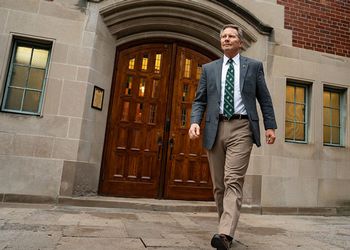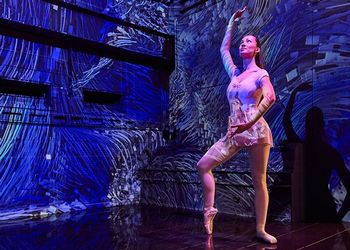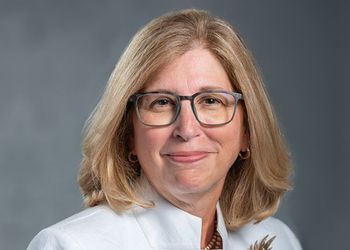Feature: MSU Prepares Teachers to Reach the Heart of the City

Long known for being tops in elementary and secondary education, MSU’s College of Education is now emerging as a model for excellence in urban education programs.
When James Patterson—yes, the mega-selling author James Patterson— decided to invest in the future’s best teachers, Michigan State University rose to the top of his list.
With a reputation for preparing leaders in education, the university’s programs in elementary and secondary education have been ranked No. 1 in the nation by U.S. News & World Report for 18 consecutive years.
But Patterson, who has been ramping up his efforts to boost literacy in the U.S., was especially impressed by a lesser-known fact about the College of Education at MSU—its commitment to improving urban schools.
The number of graduates who are ready, and committed, to serve in high-need areas like Detroit and Chicago has been growing steadily over the past 10 years as the faculty continues to develop specialized courses and programs.
Patterson announced in June 2012 he would be creating scholarships for future teachers enrolled in a key part of the pipeline, the Urban Educators Cohort Program (UECP). His $60,000 gift will cover $7,500 in tuition each year for eight students starting this fall, and the funding could grow in future years.
Candidates for the scholarship must select English or Language Arts as their teaching major or minor.
“When I read about the excellent teaching programs at MSU’s College of Education and its Urban Educators Cohort, I hoped there would be an opportunity for me to help,” says Patterson, the writer of detective novels such as the well-known Alex Cross series as well as several children’s books.
In a letter to MSU President Lou Anna K. Simon, Patterson notes, “. . . My passion is to get more and more kids excited about reading, and training the next generation of great teachers is essential to that mission.”
The MSU model
“As a land-grant university, it’s critical for Michigan State University to be engaged in helping to improve education in urban areas, both here in the state as well as elsewhere,” says Donald E. Heller, who became dean of the college in January. “The commitment is manifested in many ways, through our research projects such as the College Ambition Program, our outreach efforts supporting educators in Michigan’s lowest-performing schools, many of which are in urban areas of the state, and our teaching, in programs like UECP.”
Students in the Urban Educators Cohort Program start training during freshman year, two years before formally entering the teacher preparation program. By observing real classrooms and taking tailored courses together, they begin to understand early on how issues such as power, privilege and poverty affect urban schools.
Most importantly, says Assistant Dean Sonya Gunnings-Moton, MA ’83, PhD ’89, they learn how they can help transform communities as educators. More than 280 students have enrolled in the program since 2006, including two groups of graduates now working full-time in big cities.
Why should MSU focus on urban education? Consider the statistics. There are more than 17,000 public school districts in the United States and just 100 of them—the nation’s largest—educate nearly a quarter of all children, including 35 percent of all minorities.
According to the National Center for Education Statistics (NCES), 56 percent of students in those 100 districts—mostly in urban settings— come from low-income families.
On average, only about two-thirds of ninth graders in those districts graduate from high school on time.
“Urban education is a front and center college-wide priority,” Gunnings- Moton says. “It is about providing high-quality professional preparation, keeping our college relevant within the landscape of what’s happening in public education and ultimately creating equitable opportunities for the children who are students in urban K-12 school districts.”
Many argue that the academic and social challenges at play in urban districts require a unique set of policies, administrators and teachers.
Leaders in MSU’s College of Education believe urban students deserve teachers who will pledge to stick around no matter how budgets and reforms fumble—teachers who know how to cultivate resources and potential others fail to notice. Teachers like UECP graduate Christopher Waston, ’11, who was named Michigan Student Teacher/Intern of the Year in 2012. He won the annual competition, beating hundreds of aspiring teachers statewide, based on a lesson plan about active verbs for third-graders at Bates Academy in Detroit.
His ability to incorporate rap, technology and local culture into the lesson, then critically reflect on what worked, helped him stand out during his fit h-year internship (a requirement of the teacher preparation program). His experiences with the MSU College of Education—starting before college—helped him build the confidence and skills to take the lead in any urban classroom.
A graduate of Detroit Public Schools himself, Waston says he realized his potential to become an “agent of change” while participating in the Summer High School Scholars Program. The four-week retreat on MSU’s campus focuses on preparing 10th, 11th and 12th graders from urban areas for success in college with an emphasis on careers in education.
Offered every summer for up to 70 teens, the retreat has become the gateway for a growing number of Spartan teachers. The number of Detroit residents pursuing teacher certification at MSU has more than doubled since fall 2003, with about 50 students now in the process.
“The Summer Scholars program was the first time I was able to look critically at education as a whole, or see the faults,” says Waston, who is now one of the instructors. “I was fortunate enough to attend a (high) school in which 95 percent of the students went on to college, but I was also frustrated how these experiences weren’t being translated to everyone, especially in urban areas. I knew I needed to do something.”
He decided to apply to MSU and the close-knit Urban Educators Cohort Program, which admits a geographically and racially diverse group of 75 students each year. Members get a jumpstart on their preparation through special courses and field experiences as freshmen and sophomores, then complete their remaining field requirements—including the internship—in urban locations.
The Detroit connection
Many education students at MSU also experience urban teaching during an optional summer program in Detroit. Open to all teacher candidates and not just those in UECP, the Urban Immersion Fellowship places about 50 students in summer school classrooms and community-based youth programs over six weeks.
They teach, tour the city, interact with local leaders and attend weekly seminars on topics such as youth development and classroom management. Survey data show the fellowship, which started in 2004, builds students’ interest in urban education careers and challenges preconceived notions.
One student commented, “Th is experience changed my perspectives in a positive way, 180 degrees. I was once a suburban girl who only came to Detroit for sporting events; I now boast and brag about my students, my city, my community that I called home this summer . . .”
The College of Education has a long history of working with Detroit Public Schools (DPS). The existing pipeline for producing urban teachers grew out of a partnership between MSU, DPS and the Broad Foundation, which agreed to provide up to $6 million, in 2003.
Today those initiatives—the Urban Immersion Fellowship, the Summer High School Scholars Program and a set of scholarships specifically for urban teacher candidates—receive funding from the MSU Provost’s Office and the college itself.
And the commitment to improving education in Detroit took on even more solid footing when the university opened the MSU Detroit Center on Woodward Avenue three years ago. The College of Education has made its Southeast Michigan headquarters there, using the space to hold regular classes for interns teaching in local schools as well as for various meetings and events.
“Many people are reluctant to engage in partnerships with urban schools but MSU has certainly shown a commitment to Detroit Public Schools,” says Robynn Diamond, executive director of recruitment and employment services at DPS. She says the internship program and particularly the summer fellowship, which is unique to MSU, has paid dividends for the district.
“It gives me an avenue to recruit highly skilled professionals who are willing to embrace what our schools and our students have to off er,” she adds. “Without giving them opportunities to gain awareness of what urban education is truly like, I don’t know that we would be able to recruit such talent.”
Growing to Chicago, graduate students and more
All teacher candidates at MSU learn about the concept of social justice in education through TE 250, a required course. They begin thinking about how they will, within the unique historical, political or economic contexts of their schools, work to make academic success a reality for all children in their care.
Not every student gets an opportunity to spend time in urban classrooms (or wants to necessarily), but the number of future teachers completing the program’s signature fit h-year internship in urban schools is growing. Interns teach in Michigan cities like Lansing, Pontiac, Flint and Grand Rapids, and now, Chicago, IL.
MSU started partnering with Chicago Public Schools—whose leaders were seeking relationships with the country’s highest-quality teacher preparation programs—to provide intern placements four years ago. Nearly 40 students are there this fall.
As the faculty’s focus on urban education grows, so have the opportunities for graduate students to study issues of urban education in depth. The new Urban Education Graduate Certificate program involves an interdepartmental sequence of courses for Ph.D. students and a related speaker series that has brought national experts such as Pedro Noguera and Ronald Ferguson to packed audiences on campus.
Christopher Dunbar, MSU professor of educational administration, directs the certificate program and was one of the coordinators of Michigan’s first-ever State Symposium on African-American Male Youth in May 2012. Held in Erickson Hall on the MSU campus, the event brought together male high school students and key leaders from across Michigan to explore issues related to health, employment, juvenile justice and education. Several faculty members and graduate students from the College of Education facilitated discussions.
“We want school districts and the general public to know that MSU is a place where educators can gain the knowledge and insight to successfully teach, lead and conduct research in urban school environments,” Dunbar says.
UECP member LaShawn Hanes, ’12, who started her teaching internship in Chicago, is one student who has raised her aspirations by making connections between teaching and research.
She was part of a small group of undergraduate students selected in 2012 to receive a research training fellowship from the American Education Research Association (AERA). The program gives fellows rare access to workshops and networking events that help them learn how research is conducted.
Hanes was nominated by MSU Assistant Professor of Teacher Education Rebecca Jacobsen, who assisted her in designing research about urban youth and their perceptions of college.
“That really ignited her passion for the potential to get involved in education beyond teaching,” Jacobsen says. “She still wants to teach but it’s important, especially for a first-generation college student like LaShawn, to learn about the potential she can have to really infl uence the field.”
The College of Education has developed a system for preparing urban educators from the ground up, reaching out to youth with a spark for teaching while they are still in high school and exposing teacher candidates to prospects in research and administration before they even land their first jobs.
James Patterson and his wife Susan have funded various scholarship programs at the institutions from which they graduated, Manhattan College, Vanderbilt University and the University of Wisconsin. He decided to explore an investment at MSU because of its strong reputation for teacher education.
And alumni like Alexandria Sullens, ’11, said she definitely picked the right place. The Detroiter was going to be an engineer until she attended the Summer High School Scholars program at MSU and began to see the impact she could have in students’ lives. Her experiences as a UECP member, summer fellow and intern confirmed that teaching is absolutely what she wants to do.
“A lot of the kids in Detroit are extremely bright and talented and they have so many circumstances they go through,” says Sullens, who began her job as a 9th grade math teacher at Detroit’s King High School this fall. “I was one of those kids. It’s phenomenal that people are now starting to see that we need more and better trained teachers in urban areas. I don’t see myself anywhere else.”
> Nicole Geary is communications director in the College of Education at Michigan State University. She graduated from the MSU School of Journalism in 2003. Alumna Lauren Mehringer, ’12, contributed to this report.
Urban education at MSU: A pipeline of programs
Pre-college
> Summer High School Scholars Program
Undergraduate
> Urban Educators Cohort Program (freshman & sophomore years)
> Urban Educators Fellowship (summer before junior or senior year)
> Internship(fift h-year of teacher preparation program)
Graduate
> W.K. Kellogg Foundation Woodrow Wilson Michigan Teaching Fellowship (post-BA teacher certification in math & science)
> Doctoral Urban Specialization



